In view of the list of his successes, nobody can seriously dispute that Elon Musk has a brilliant streak as an entrepreneur: With PayPal he reinvented online payment, Tesla set the standards for electric cars ten years before the competition from Europe, and with SpaceX Musk proves that privately developed rockets fly into space faster and cheaper than NASA ever could.
But in order to run all his companies at the same time, Musk has developed an abrupt, sometimes chaotic management style, characterized by quick, drastic decisions and an obsession with detail, by hierarchical management structures and extreme working hours.
Musk is used to being listened to by everyone in his universe, he doesn't accept contradiction, let alone lengthy debates. Such a leadership style is required to lead multiple start-ups to success in parallel - and at the same time completely unsuitable for leading a complex social network like Twitter.
With the purchase of Twitter, the genius fell into the trap. Because in order to understand the mechanisms in a social network, one must above all be empathetic.
Any change to the mechanics of a platform needs careful consideration. Twitter competitor Meta tests even the smallest modification of Facebook or Instagram for weeks on small user groups.
Musk's abrupt management style doesn't work here. A social network is not a start-up in which everyone is working towards the same goal, on the contrary: it is a reflection of our society and, as in every society, there are those who want to participate - and those who like to disturb, the trolls. Musk should have known that before getting involved, as he was once perhaps the most influential Twitter troll himself.
But Musk is currently proving that he just didn't understand the mechanisms of his platform: He, who bought Twitter with the stipulation that freedom of expression should be above everything else, is now setting up special rules for himself - and thus reducing everything he supports to absurdity so far stood.
His most recent mistake: he blocked the Twitter account "Elonmusksjet", which automatically documented the flights of Musk's private jet from publicly available data on aircraft movements.
He should have endured so much transparency, "free speech" and so on. Instead, Musk introduced a new usage rule to turn off the account he didn't like.
And he proved that he didn't understand one of the fundamental effects of a social network: Only when information is suppressed does it gain in importance and suddenly become interesting - the so-called "Streisand effect" takes effect:
Suddenly the topic “Elonmusksjet” was trending on Twitter. Well-known US journalists publicly discussed the contradiction between Musk's right to freedom of expression and the block decision in a virtual "Twitter Space" on Thursday.
When Musk himself broke into the discussion round unasked, he got stuck in his attempt to justify himself, didn't answer questions, left the round again - and a few seconds later switched off the "Spaces" function completely to discuss the debate per Ordre de Mufti, which he didn't like to end.
He also quickly blocked the Twitter user accounts of various US journalists who reported critically about his behavior. The decision would have been worthy of a dictator, but not of a Twitter CEO who carries freedom as a mantra on the flags.
With the recent bans, Musk is devaluing Twitter as a platform for the democratic exchange of opinions, destroying his investment and endangering the preservation of the “common digital town hall square” – the goal Musk started with just a few weeks ago.
If the boss can dictate what topics aren't acceptable, then Twitter is dead. The recent bans promptly sparked a mass exodus of users to rival network Mastodon.
Musk's reaction is telling, reminiscent of that of a defiant rich kid: if the other kids don't want to play with him by his rules, then they can't play anywhere else either. Recently, users can no longer post Mastodon links on Twitter.
Elon Musk would be wise to recognize that his involvement with Twitter is misguided, that his methods are not working here.
He should focus on what he can - and leave the running of Twitter to an experienced social media manager. This would ensure Musk's preservation of the platform and his fortune. Otherwise there is a risk of exodus of users, advertisers and staff, and the Twitter experiment will fail.
"Everything on shares" is the daily stock exchange shot from the WELT business editorial team. Every morning from 5 a.m. with the financial journalists from WELT. For stock market experts and beginners. Subscribe to the podcast on Spotify, Apple Podcast, Amazon Music and Deezer. Or directly via RSS feed.

 Germany: abortions should be authorized up to 12 weeks, concludes a commission launched by Olaf Scholz
Germany: abortions should be authorized up to 12 weeks, concludes a commission launched by Olaf Scholz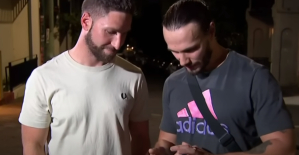 Knife attack in Australia: who are the two French heroes congratulated by Macron?
Knife attack in Australia: who are the two French heroes congratulated by Macron? Faced with an anxious Chinese student, Olaf Scholz assures that not everyone smokes cannabis in Germany
Faced with an anxious Chinese student, Olaf Scholz assures that not everyone smokes cannabis in Germany In the Solomon Islands, legislative elections crucial for security in the Pacific
In the Solomon Islands, legislative elections crucial for security in the Pacific Covid-19: everything you need to know about the new vaccination campaign which is starting
Covid-19: everything you need to know about the new vaccination campaign which is starting The best laptops of the moment boast artificial intelligence
The best laptops of the moment boast artificial intelligence Amazon invests 700 million in robotizing its warehouses in Europe
Amazon invests 700 million in robotizing its warehouses in Europe Inflation rises to 3.2% in March due to gasoline and electricity bills
Inflation rises to 3.2% in March due to gasoline and electricity bills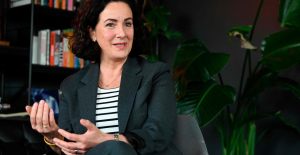 Against drug trafficking, the mayor of Amsterdam advocates the regulation of cocaine
Against drug trafficking, the mayor of Amsterdam advocates the regulation of cocaine Hachette Livre removes Isabelle Saporta from management of Fayard
Hachette Livre removes Isabelle Saporta from management of Fayard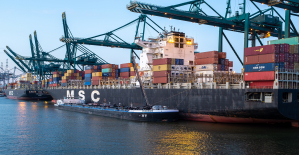 Where is the MSC Aries, the ship boarded by Iran?
Where is the MSC Aries, the ship boarded by Iran?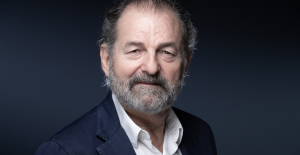 Denis Olivennes at Le Figaro: “CMI France discusses with Natacha Polony the future of Marianne”
Denis Olivennes at Le Figaro: “CMI France discusses with Natacha Polony the future of Marianne”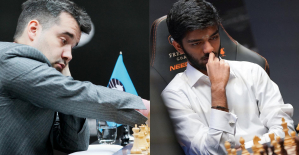 2024 Candidates Chess Tournament: Relive the Crucial Nepo-Gukesh Game
2024 Candidates Chess Tournament: Relive the Crucial Nepo-Gukesh Game Borgo, by Stéphane Demoustier: locked outside
Borgo, by Stéphane Demoustier: locked outside Release of hostages and immediate ceasefire: at the Venice Biennale, the Israeli pavilion resonates with Gaza
Release of hostages and immediate ceasefire: at the Venice Biennale, the Israeli pavilion resonates with Gaza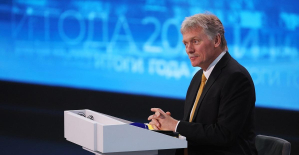 Two Russian artists declared “terrorists and extremists” because of a play
Two Russian artists declared “terrorists and extremists” because of a play Skoda Kodiaq 2024: a 'beast' plug-in hybrid SUV
Skoda Kodiaq 2024: a 'beast' plug-in hybrid SUV Tesla launches a new Model Y with 600 km of autonomy at a "more accessible price"
Tesla launches a new Model Y with 600 km of autonomy at a "more accessible price" The 10 best-selling cars in March 2024 in Spain: sales fall due to Easter
The 10 best-selling cars in March 2024 in Spain: sales fall due to Easter A private jet company buys more than 100 flying cars
A private jet company buys more than 100 flying cars This is how housing prices have changed in Spain in the last decade
This is how housing prices have changed in Spain in the last decade The home mortgage firm drops 10% in January and interest soars to 3.46%
The home mortgage firm drops 10% in January and interest soars to 3.46% The jewel of the Rocío de Nagüeles urbanization: a dream villa in Marbella
The jewel of the Rocío de Nagüeles urbanization: a dream villa in Marbella Rental prices grow by 7.3% in February: where does it go up and where does it go down?
Rental prices grow by 7.3% in February: where does it go up and where does it go down? Europeans: the schedule of debates to follow between now and June 9
Europeans: the schedule of debates to follow between now and June 9 Europeans: “In France, there is a left and there is a right,” assures Bellamy
Europeans: “In France, there is a left and there is a right,” assures Bellamy During the night of the economy, the right points out the budgetary flaws of the macronie
During the night of the economy, the right points out the budgetary flaws of the macronie Europeans: Glucksmann denounces “Emmanuel Macron’s failure” in the face of Bardella’s success
Europeans: Glucksmann denounces “Emmanuel Macron’s failure” in the face of Bardella’s success These French cities that will boycott the World Cup in Qatar
These French cities that will boycott the World Cup in Qatar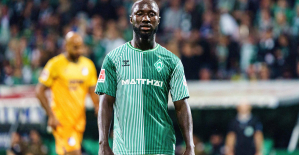 Bundesliga: Naby Keita suspended by Werder Bremen until the end of the season
Bundesliga: Naby Keita suspended by Werder Bremen until the end of the season Euro 2024: the Blues reveal their opponents for friendlies in June
Euro 2024: the Blues reveal their opponents for friendlies in June Cycling: De Marchi wins the 2nd stage of the Tour of the Alps
Cycling: De Marchi wins the 2nd stage of the Tour of the Alps Paris Olympics 2024: Joris Daudet (BMX) candidate to be French flag bearer
Paris Olympics 2024: Joris Daudet (BMX) candidate to be French flag bearer


















